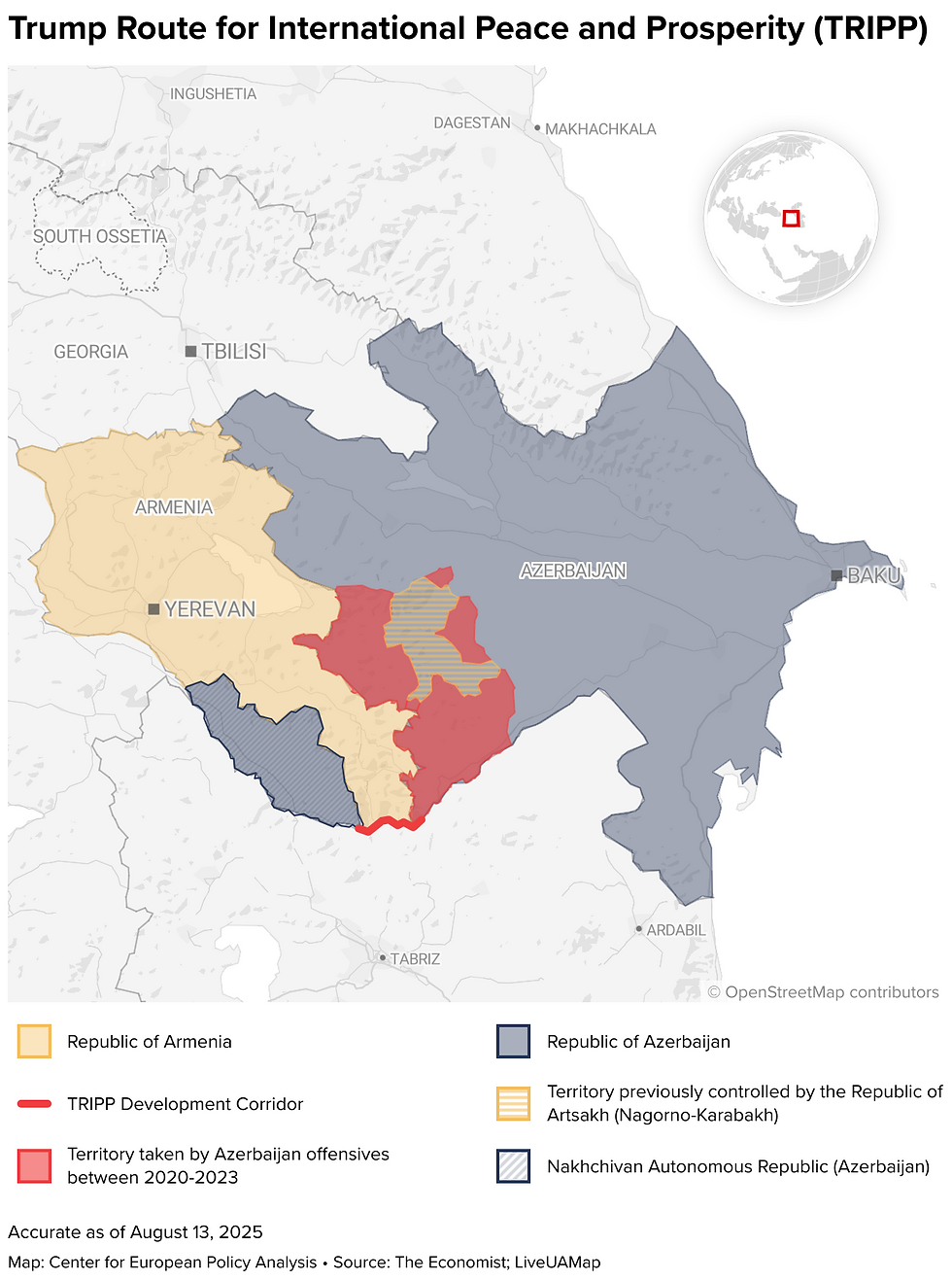Armenia’s Foreign Policy Revolution
- Sep 18, 2025
- 4 min read
Armenia’s heavy reliance on Russia is coming to an end as Yerevan works to extend relationships and repair once-shattered regional ties.

Photo: Press Service of the President of Azerbaijan
Armenia signed a strategic partnership agreement with China during the Shanghai Cooperation Organization (SCO) summit on August 31. Both sides pledged to expand commercial and investment ties and — more tellingly — backed one another’s independence and sovereignty.
This follows earlier statements made by the Armenian leadership that the country is interested in officially becoming a member of the SCO, a Beijing-run grouping.
Why does it matter? The deal is the latest in a series of Armenian measures to shift from its traditionally heavy reliance on Russia and toward better diversified external relations. That will prove a challenge, since the Kremlin is jealous of its position in the South Caucasus, and because the reliability and intentions of countries like China are far from clear.
Armenia’s intention is to reverse the geopolitical isolation caused by the wars for Nagorno-Karabakh, which it lost to Azerbaijani forces in 2023. In Armenian eyes, Russia had pledged to aid it and failed to do so. That brutal lesson in political realpolitik still haunts the country.
So it seeks closer ties with neighbors and great powers in both the East and the West.
China is just one aspect of this approach. Armenia has revived the country’s historic ties to France with agreements including arms shipments, and is also working on concluding a strategic agreement with the UK to improve security and military ties. Negotiations are likewise underway with the European Union (EU) on expanded cooperation within the new EU-Armenia Partnership Agenda, which would replace the partnership priorities adopted under the Comprehensive and Enhanced Partnership Agreement (CEPA) reached in 2018. The visa liberalization scheme is yet another program that was recently initiated to pull Armenia closer to the EU.
The country has also improved relations with the US. The two signed a strategic partnership agreement early this year during the last days of the Biden administration and the so-called TRIPP agreement reached on August 8 with Azerbaijan, along with the bilateral US-Armenia agreements on cooperation in nuclear, commercial, and political matters, underscore the nature of an expanding partnership.
Armenia is meanwhile pushing for improved ties with Turkey, evidenced by multiple meetings between the leaders of the two countries and most of all Armenian Prime Minister Nikol Pashinyan’s historic visit to Ankara in June. Turkey closed the border and severed diplomatic ties more than 30 years ago when fighting began with its ally, Azerbaijan, over Nagorno-Karabakh. A thaw offers a better relationship with a key regional player and improved trading links as routes to the west open up.
Armenia has made progress with Azerbaijan, its chief rival. Yet, the power imbalance pushed Yerevan to take a more pragmatic stance by seeking a permanent solution to the conflict by agreeing to recognize Nagorno-Karabakh as part of Azerbaijan. There are also efforts to normalize relations with Pakistan, which until recently remained the only country that refused to recognize Armenia’s existence out of friendship with Azerbaijan and Turkey.
For Beijing, closer relations with Yerevan are a logical continuation of the policy in the South Caucasus that followed the signing of strategic cooperation documents with Georgia in 2023 and then two agreements with Azerbaijan in 2024 and 2025.
All of which has caused jitters in Iran, Armenia’s southern neighbor, which has taken a pounding from Israeli and US air attacks in June. The two countries have been close, and Tehran is concerned about the US involvement in a corridor through Armenia. For Iran, the territorial integrity of Armenia is a key foreign policy goal. Following the TRIPP agreement, the Iranian president visited Yerevan, and several bilateral documents were signed, including on the development of border infrastructure. A few days later, a high-ranking Armenian delegation visited Tehran, where the topic of discussion was once again the corridor passing through Armenia.

The Iranian response helps illustrate one serious problem in Armenia’s outreach program — new deals bring better relations in one area but risk them in another.
Despite the rhetoric and hopes for a more balanced foreign policy, there are certain realities that Armenia cannot change.
The first is that Russia remains important in the regional balance of power. Armenia is highly unlikely to ditch Moscow-led multilateral institutions such as the Collective Security Treaty Organization (CSTO) and especially the Eurasian Economic Union (EAEU), given the economic advantage Yerevan garners.
The second is that the value of the new deals is unclear. Can China really be trusted to aid Armenia in any way, given its treatment of Ukraine since the all-out invasion? The days when Beijing would be relied upon to defend national territorial integrity as the centerpiece of its foreign policy are long gone.
And even if Armenia changes its constitution to abandon the claim on Nagorno-Karabakh, will dictatorial Azerbaijan’s post-war swagger diminish? Will Turkey become more even-handed, given its longstanding ties to the Azeris? Can France and the EU act as a balance, given geographical remoteness and a host of more pressing problems closer to home?
Yet the relationship with Russia is changing, and the Kremlin knows it. Where Russia was once first among equals, that primacy is now gone.
The name of the author has been withheld to shield him/her from retribution by dictatorial and authoritarian states. Article first time published on CEPA web page. Prepared for publication by volunteers from the Res Publica - The Center for Civil Resistance.




Comments